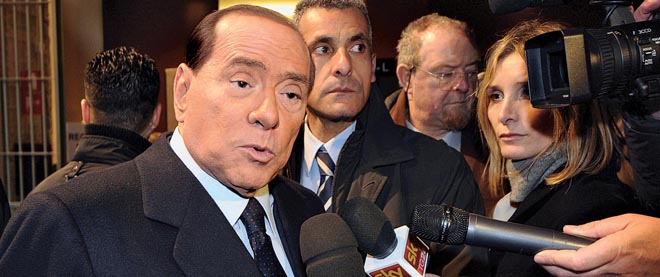Silvio Berlusconi uses nod to Mussolini to boost his own image
A softer brand of fascism makes a comeback in Italy
Pier Marco Tacca/Getty Images
Share

Last week, sombre crowds gathered in capital cities across Europe to commemorate Holocaust Memorial Day. In Berlin, Chancellor Angela Merkel firmly atoned, in a podcast, for her country’s wartime past.
At a memorial in Milan, Silvio Berlusconi appeared far less contrite. Rather, the former Italian prime minister used the occasion to celebrate Benito Mussolini’s wartime alliance with Adolf Hitler. Berlusconi cheered the Fascist dictator for his muscular leadership—and dismissed his pact with Hitler as a half-hearted political manoeuvre. “The racial laws were the worst fault of Mussolini,” Berlusconi granted. But “in so many other ways” Mussolini “did well.”
Berlusconi’s political opponents fear his Mussolini-propping stunt will actually boost his support ahead of February elections. With less than a month to go, Berlusconi has closed the gap between his People of Liberty party and early front-runner Pier Luigi Bersani’s Democratic party, to around 10 per cent.
“Over the last 20 years, there has been a project to gradually rehabilitate Mussolini,” says Reading University professor Christopher Duggan, who just wrapped up a five-year study on the cult of Mussolini. Sixty-eight years after the war ended, and Mussolini’s dead body was hung from meathooks outside a Milan gas station, there has been a “softening of the image of fascism,” Duggan says.
First, there’s the swag. According to European broadsheets, the sale of pens, keychains and coasters featuring Mussolini (usually with a hand raised in Fascist salute) is flourishing. “We are selling more than we did 10 years ago,” explains Renato Circi, of the Rome-based company Gamma 3000, which prints Mussolini calendars.
Today, veneration of Il Duce is ubiquitous and brazen. Every year, hundreds of thousands make the pilgrimage to Predappio, Mussolini’s hometown, where they stroll the streets in black, an homage to Mussolini’s paramilitary wing, the Blackshirts. Last year, a town outside Rome spent over $170,000 on an ornate tomb for one of Mussolini’s most heavy-handed henchmen. Two years earlier, a Mussolini iPhone app—a collection of the dictator’s biggest oratorical hits—became a No. 2 bestseller on iTunes’s Italian store. Mussolini’s granddaughter (a former Playboy model) serves in Parliament. And last autumn, when young neo-Fascists gathered in Rome to protest cuts, their rallying cry was “Viva Il Duce!”
Such support would have been unimaginable in the years after the war. For Bersani, this is about politics. Berlusconi’s remarks, he says, were “an electoral manoeuvre to reclaim votes from the Fascist right by giving a friendly wink to Mussolini.” That today’s Italy is one of Europe’s most economically ravaged states—and that Mussolini was a supporter of welfare expansion—can only strengthen Berlusconi’s hand. Il Duce, says Duggan, has come to represent an elusive time when things were better: when there was public order and national cohesion. Under Mussolini, Italians like to recall, the trains ran on time.
Berlusconi works hard to shore up this fantasy. “Mussolini never killed anyone,” he once famously insisted. “Mussolini sent people on holiday.”